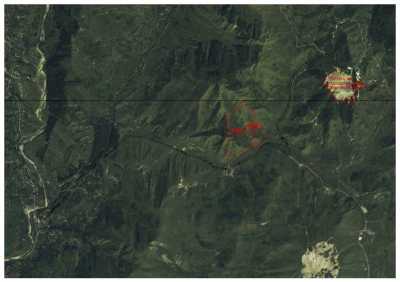The WPJ
THE WORLD PROPERTY JOURNALReal Estate Facts Not Fiction
Featured Columnists

Meet ALGO, Real Estate Agent of the Future
Residential News » Market Buzz | By Michael Gerrity | January 28, 2015 11:52 AM ET
I recently watched the movie titled "Her", a 2013 American romantic comedy set some ten to fifteen years in the future, starring Joaquin Phoenix as a lonely man who develops a personal relationship with 'Samantha', an intelligent cell phone APP personified through a female voice played by Scarlett Johansson.
'Samantha' is basically a downloaded algorithm (a smart phone APP) with self-learning artificial intelligence, voice recognition capabilities, and a conversationally enabled personalized operating system.
An algorithm, or 'ALGO' as it is called in the technology industry, is simply a set of computer coding instructions to execute an order, or set of commands. Algorithms are widely used today in places such as automated electronic stock trading platforms of the NYSE, NASDAQ and IEX exchanges.
As the movie unfolds, the APP (Samantha) learns the man's history, likes, dislikes, activities, reads all his emails, his travels (via cell phone GPS), and scours the global web and all databases for all thing related to him, and develops a complete human profile on him in seconds!
As the APP (algorithm) builds a complete and accurate profile on the man, it then begins to hold actual conversations with him with her artificial intelligence. As "she" asks him questions, follows and sees his moves via GPS and cell phone camera lens; a powerful thing begins to happen - "she" starts to 'make suggestions' to him that are perfectly tailored to his wants, needs and desires BEFORE he even thinks of them, no matter where he goes, or what he does.
The APP has become a better friend, advisor and companion than most of his human friends. The APP understands his needs, desires and wants, yet has no emotion or judgments against him, regardless of what he does. In effect, the APP has evolved to a point where "she" has a human-like 'consciousness' and bond with the man, and vice versa - feelings for each other!
And while this is science fiction for now, it will not be for long, given the pace and explosion of information, data and sensoring of everything taking place today!
There is a new tech term you're now beginning to hear a lot more of called "The Internet of Everything", which loosely describes how we have entered the third leg of evolution of the Internet (aka Web 3.0).
To put this in perspective, the fixed Internet (Web 1.0), which is really what we had in the late 1990s, connected about a billion users to the Internet, primarily via their desktops. In the 2000s (Web 2.0), we had the second wave, which connected about two billion people to the Internet via their mobile devices and social networks. What we're talking about now with the 'Internet of Things' aka "IOT" (Web 3.0), is the connecting, measuring and capturing of data for about 30 billion or more 'things' to the Internet in the course of the next decade, beyond just connecting people in the past (see Goldman Sachs' Internet of Things graphic below to learn more).
These 'things' are your car, home, body, friends, family members, locations, health records, financial records, work history, education, crime records, financial history, personal habits, buying preferences, shopping patterns, dislikes, dreams, desires and hopes...all traceable, captured and gleaned from an individual's daily activities.
These 'things' are beginning to track and capture our patterns and data signatures (like Apple's NEST in your 'connected homes' now, and wearable devices from Nike, Adidas, and Google). Very smart mathematical algorithms are now watching, tracking and capturing all kinds consumer behavioral data, and beginning to calculate and build very precise personality, health, education and financial profiles on each of us.
Watch TED Talk on the explosion of Algorithms and Big-Data that can build precise personality profiles of you today, without you even knowing it:
Based on our profiles, locations, capabilities, likes, dislikes, financial strength, etc...these smart algorithms will be able to tap into millions of databases on the planet and search for information on you and for you...and begin to make very 'personalized suggestions'. This creates a far more compelling world of services than exists at present. In effect, we will enter the realm of 'executing' on our desires and 'negotiating' our transactions in the real 'kinetic' world, not just the cyber world. And "No", I'm not saying these APPs are going to be some sort of physical 'cyborg' machine like in the movie 'The Terminator' played by Arnold Schwarzenegger, but are cloud-based software programs, 'matching engines' and big-data warehouses on the global web.
With the exponential growth of self-learning supercomputing Algorithms and big-data capabilities, tens of millions of potential jobs may be at risk in the next 10 to 20 years, including real estate agents, stock brokers, doctors, lawyers, teachers, etc...many potentially being replaced by algorithmic-driven downloadable smart phone APPs.
Watch video of over 1m shares of J & J stock being traded around the world in half a second.
As humans are replaced by far more efficient algorithmic business-service APPs, the 'transaction cost' of each deal will be lowered significantly. In the case of the real estate industry, the standard 3% to 6% real estate commission may get reduced to a $100 or $200 downloaded APP purchase price. And that is no small cost reduction number, we're talking about over $30 billion in annual real estate 'transaction' commissions being disrupted, and going back to the buyers' or sellers' pockets as the middleman is eliminated by these APPs.
According to a Bloomberg article last year, up to 50% of all US jobs may be at risk in the coming one to two decades from the explosion of data, and the computational power of all this data via connected devices and databases.
Now I know this column will upset many real estate agents (which is not my intention), and they will rebuff this idea of smart APPs replacing agents in the coming decades because, as they will say: "People still want to work with other humans in buying a home".
While that rebuttal statement may be true for an older generation of today (baby boomers mainly), it is not true for our kids.
Our kids won't be so emotionally reliant upon the 'human' hand-holding aspect of buying a home in the future. And for those who want human interaction representing them, they can still have it, and pay an added 3% human broker commission premium in the transaction.
The new generation of kids who are growing up today exclusively using Notepads, smart phones and APPs, will have no problem downloading an APP, programming it with verbal 'talk' commands and instructions of their buying preference and financial background. Then the APP will go out to the global web and pull all known data of available matching properties for sale, or lease, the landlord's backgrounds, neighborhood data, school information, and advice for the buyer on various buying options--all in a matter of seconds.
These APPs will also be able to schedule property tours with the other APPs that have the listings, and actually tour the property with the buyers-investors-tenants via their cell phone, talking to them as they walk from room to room because the APP has GPS tracking that can marry the seller's home data to the buyer's location in real-time.
Finally, these APPs will be able to calculate with great probability the chance of the seller accepting a lower priced offer based on scouring all related seller data to determine risk profiles, financial situation, job status and the need to sell the property now at a lower price, versus hold out for a higher price later - and with great accuracy - in seconds!
This is the holy grail of computing we're talking about now - highly customized predictive analytics - in real-time!
An example of this technology now is how Amazon.com starts to make book purchase suggestions to you based on your prior book searches and purchase activity, or how Netflix suggests TV shows or movies to watch based on your prior viewing patterns on Netflix. This 'predictive analytics' technology is real and already exists today.
Not only will these algorithms have the ability to find and present listings data, neighborhood data and mortgage rates like Zillow and Trulia sites of today, but they will ALSO have the ability to advise buyers, suggest offer strategies, compare values and calculate price offers - all in real-time...and if an offer is made and accepted, close the transaction legally over a single voice command.
My ideas are not meant to upset the real estate agent industry at large. Most are smart, dedicated, hard-working professional people that DO add value to the real estate buying, selling, investing process for millions of people a year.
But change is coming, and I'm just trying to forewarn them of the coming technological advances of business-focused 'Service APPs' that are very smart, self-learning, voice enabled, all-knowing and big data-driven algorithms that will disrupt many professional service-based industries (i.e., real estate, financial, law, medicine, tourism, education, etc...).
Bottom line, the evolution of technology is like gravity - it is inevitable and non-negotiable.
Sign Up Free | The WPJ Weekly Newsletter
Relevant real estate news.
Actionable market intelligence.
Right to your inbox every week.
Real Estate Listings Showcase

$2,495,000
Condo For Sale
Boca Raton, Florida

5,300,000 CAD
Home For Sale
Mission, Canada

$740,000
Home For Sale
West Palm Beach, Florida

49,000,000 THB
Villa For Sale
Hua Hin, Thailand

€450,000
Home For Sale
Central Istria, Croatia

$2,620,000
Home For Sale
Tarzana, California

€800,000
Apartment For Sale
Lisboa, Portugal

$1,350,000
Mixed Use For Sale
Huaraz, Peru

€1,600,000
Residential Land For Sale
Scortoasa, Romania

$350
Home For Rent
Lake Arrowhead, California

$2,800,000
Commercial New Construction For Sale
General Luna, Philippines

$750,000
Mixed Use For Sale
Corozal, Belize
Related News Stories
Featured Columnists Real Estate Headlines
- More Americans Opting for Renting Over Homeownership in 2024
- BLOCKTITLE Global Property Tokenization Platform Announced
- Small Investors Quietly Reshaping the U.S. Housing Market in Late 2024
- Greater Miami Overall Residential Sales Dip 9 Percent in November
- U.S. Home Sales Enjoy Largest Annual Increase in 3 Years Post Presidential Election
- U.S. Housing Industry Reacts to the Federal Reserve's Late 2024 Rate Cut
- U.S. Home Builders Express Optimism for 2025
- Older Americans More Likely to Buy Disaster-Prone Homes
- NAR's 10 Top U.S. Housing Markets for 2025 Revealed
- U.S. Mortgage Delinquencies Continue to Rise in September
- U.S. Mortgage Rates Tick Down in Early December
- Post Trump Election, U.S. Homebuyer Sentiment Hits 3-Year High in November
- Global Listings Aims to Become the Future 'Amazon of Real Estate' Shopping Platform
- Greater Las Vegas Home Sales Jump 15 Percent in November
- Ultra Luxury Home Sales Globally Experience Slowdown in Q3
- World Property Exchange Announces Development Plan
- Hong Kong Housing Market to Reach Equilibrium in Late 2025
- Construction Job Openings in U.S. Down 40 Percent Annually in October
- U.S. Mortgage Applications Increase in Late October
- World Property Markets, World Property Media to Commence Industry Joint-Venture Funding Rounds in 2025
- New Home Sales Hit 2 Year Low in America
- U.S. Pending Home Sales Increase for Third Consecutive Month in October
- Pandemic-led Residential Rent Boom is Now Fizzling in the U.S.
- Emerging Global Real Estate Streamer WPC TV Expands Video Programming Lineup
- 1 in 5 Renters in America Entire Paycheck Used to Pay Monthly Rent in 2024
- U.S. Home Sales Jump 3.4 Percent in October
- Home Buyers Negotiation Power Grows Amid Cooling U.S. Market
- Canadian Home Sales Surge in October, Reaching a Two-Year High
- Greater Orlando Area Home Sales Continue to Slide in October
- U.S. Mortgage Credit Availability Increased in October
- U.S. Mortgage Rates Remain Stubbornly High Post Election, Rate Cuts
- Construction Input Prices Continue to Rise in October
- BETTER MLS: A New Agent and Broker Owned National Listings Platform Announced
- Home Prices Rise in 87 Percent of U.S. Metros in Q3
- Caribbean Islands Enjoying a New Era of Luxury Property Developments
- The World's First 'Global Listings Service' Announced
- Agent Commission Rates Continue to Slip Post NAR Settlement
- Market Share of First Time Home Buyers Hit Historic Low in U.S.
- Greater Palm Beach Area Residential Sales Drop 20 Percent Annually in September
- Mortgage Applications in U.S. Dip in Late October





